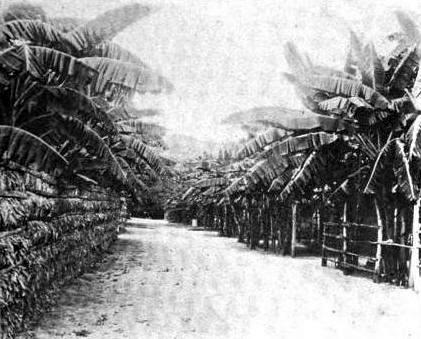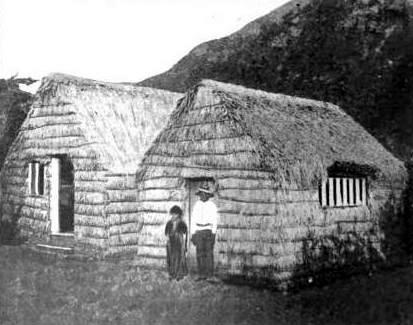|
Contents –– name –– About the Transcription –– Bibliographic Information |
The Plough Boy JournalsThe Journals and Associated Documents The Plough Boy AnthologyDictionaries & Glossaries |
THEMISSIONARY REVIEW OF THE WORLDVol. XIV. New Series Vol. XXIV. Old SeriesJanuary to December, 1901 |

BANANA AVENUE, BONIN ISLANDS.Mun-nin-to (meaning No-man-land). This was afterward corrupted into Bu-nin-to, and then shortened into the present form, Bo-nin. For more than two and a quarter centuries we hear little of them, except that they were visited from time to time by whaling ships which touched there for water and fuel, and a legend says that it became a place where whalers and pirates hid their treasures, a mass of stones on one of the islands to-day giving its silent tho doubtful testimony in support of it. The modern history of the islands dates from their rediscovery in the year 1827 by one Captain Beechey, a British sea-captain, who was out in search of the John Franklin expedition, He formally took possession of them in the name of King George, and nailed a copperplate to a tree with the statement thereupon, and gave names to the various islands, there being three distinct clusters, each cluster having three or four medium-sized islands and numbers of rocky islets too small to be habitable by man. He notified the British Consul in Honolulu of his discovery, and three years later a small vessel was equipped with a motly crew of stranded seamen and natives, supplied with a few cattle, fishing and farming implements, who came to settle the islands in 1830. Twenty-three years later Commodore Perry, U. S. N., touched at the islands, encouraging the settlers whom he found there, giving them assistance of various kinds, and the living record of his visit to-day remains in |
the person of Horace Perry Savory, for whom the Commodore stood godfather at his baptism during his visit. The settlers were mostly of European extraction, and many nations have contributed a man or two to the settlement. The names indicate American, English, French, Danish, Portuguese origin, besides several nondescripts. Foremost among them were an American named Nathaniel Savory, a native of Bradford, Essex County, Mass., three Englishmen named Webb, Gilly, and Robinson, and a Portuguese named Gonsalves. The settlers to-day are mostly descended from these forefathers. The islanders lived in prosperity and comfort, gaining an abundant living from the well-nigh inexhaustible multitudes of sea-turtles and fishes, besides raising goats, poultry, and crops from the rich soil of the islands. They procured wives from among the natives and half-breeds of Guam, and in no case is there a record of a mother being a pure-blooded European woman. Hence the Bonin Islanders are a mixed race, and are peculiarly a Eurasian colony. In the year 1876 the British government formally ceded the islands to Japan, and since then the Japanese colony has become too large for the islands, numbering now about three or four thousand souls. The Japanese have brought in their train the usual diseases and hard problems that accompany the Asiatic in all his travels, and there has been no little friction between them and the descendants of the original settlers. These have now dwindled to such an extent, and so much advantage has been taken of them by the shrewder and more unscrupulous Japanese, that now they have but little property left. The chief occupation of the men has been hunting seals and otters, shipping as hunters in the various schooners that used to touch there every spring, coming from Japan and various of the American Pacific ports. They have been sought after from year to year, for they are considered crack shots with the rifle, enjoying a reputation in this line as broad as the Pacific itself. But even this is now a glory of the past, for the seals have become almost extinct, so that they hardly make back in a whole season the advance pay which is given them before embarking. The problem that confronts the Bonin Islanders to-day is a choice of three things: (1) emigration; (2) absorption by the Japanese element; (3) extinction. Two of the men went to visit Guam last year, after they had heard that it had been taken under the American flag, but they returned with no flattering report, so that others are not disposed to look to Guam as a desirable change. Some of the younger men have taken to themselves Japanese wives, as they are too nearly related among themselves (everybody being "cousin" to every one^ else) to intermarry further. A few of the younger generation have left to seek their fortunes in the great wide world outside. |
The history of missionary work among the islanders dates from a chance visit of the Rev. F. B. Plummer (Church of England) in the year 1877. He became interested in the islanders and took several of the young lads to Japan, and put them in a mission school. They remained only long enough to gather a small knowledge of books, and returned to their island home. The one who made the most of his advantages was Joseph Gonsalves, a very earnest and pious young man, now about thirty-one years of age. He is the regular catechist and representative of the Church of England (S. P. G.) in the islands, and devotes his entire time to the good and uplifting of his fellow islanders. He teaches the children in school every day, and holds service and Sabbath-school on Sunday. About once a year he comes up to Japan for further study, and has the hope of one day being an ordained evangelist or pastor. He has suffered persecution for the name of Jesus, and his life shines with no uncertain light. Tho a young man in years he is rich in experience, so that all the islanders look up to him, and come to him with all their troubles and sorrows, and regard him as their Solomon. There has never been a resident foreign missionary in the islands. In the year 1895 Miss J. N. Crosby, of the Woman's Union Mission in Yokohama, went for a six months' visit to the islands, and won the affection of the women. The writer followed, and remained six months in the winter of 1895-'96, making a later visit of six weeks in the summer of 1899. Bishop Awdry paid his first visit to the islands in the spring of 1899, and while there confirmed fourteen, the total number of those confirmed being now eighteen, and of those baptized, fifty-three. The average attendance in Joseph's day-school is fifteen, but some of his pupils are now in the mission schools at Kobe. Since the year 1894 there has been an annual visit paid to the islands by members of St. Andrew's Mission, Tokyo. They have baptized those ready for baptism, and have cheered and helped the little band of Christians on the islands. In former days the men of the Bonins were notorious as heavy drinkers, often distilling their own liquor from sugar-cane and bananas and other products, but the writer formed a temperance society among the men during his visit four years ago, and now the drunkard is the exception rather than the rule. I have found them eager for education, and soon after my departure they sent up to Japan and had the necessary heavy timbers shipped down, and built for themselves a substantial building, which is used for school on week-days and church service on the Sabbath. This they did entirely at their own expense, and at a cost of four hundred and twenty-five dollars (Japanese). Remember to pray for this little flock of sheep, far separated from Christian fellowship, and surrounded, as they are, by many of the devices and temptations and assaults of the devil. |
TRANSCRIPTION NOTESSome tables have been reformatted for clarity in HTML presentation. |
authorname, dates |
BIBLIOGRAPHIC DESCRIPTION
|
